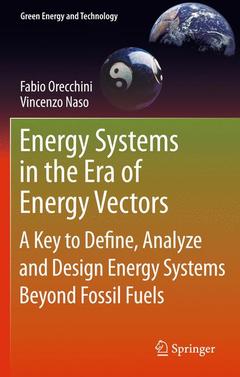Description
Energy Systems in the Era of Energy Vectors, 2012
A Key to Define, Analyze and Design Energy Systems Beyond Fossil Fuels
Green Energy and Technology Series
Authors: Orecchini Fabio, Naso Vincenzo
Language: English
Subjects for Energy Systems in the Era of Energy Vectors:
158.24 €
In Print (Delivery period: 15 days).
Add to cartPublication date: 11-2013
364 p. · 15.5x23.5 cm · Paperback
Approximative price 158.24 €
In Print (Delivery period: 15 days).
Add to cartPublication date: 10-2011
364 p. · 15.5x23.5 cm · Hardback
Description
/li>Contents
/li>Biography
/li>Comment
/li>
What lies beyond the era of fossil fuels? While most answers focus on different primary energy resources, Energy Systems in the Era of Energy Vectors provides a completely new approach.
Instead of providing a traditional consumption analysis of classical primary energy resources such as oil, coal, nuclear power and gas, Energy Systems in the Era of Energy Vectors describes and assesses energy technologies, markets and future strategies, focusing on their capacity to produce, exchange, and use energy vectors. Special attention is given to the renewable energy resources available in different areas of the world and made exploitable by the integration of energy vectors in the global energy system.
Clear definitions of energy vectors and energy systems are used as the basis for a complete explanation and assessment of up-to-date, available technologies for energy resources, transport and storage systems, conversion and use. The energy vectors scheme allows the potential realization of a worldwide sustainable energy system to fulfill global development expectations by minimizing both the impact on the environment, and the international political frictions for access to limited and concentrated resources.
Energy Systems in the Era of Energy Vectors is an informative read for researchers and advanced students in industrial, energy and environmental engineering. It also contains valuable information for managers and technicians working in the energy sector.
1. Energy Systems.- 2. Energy Resources.- 3. Energy Vectors.- 4. Energy Conversion and Transformation Plants.- 5. Distributed Generation and Cogeneration.- 6. Energy Useful Effect End Use.
Fabio Orecchini is a professor of energy systems at Guglielmo Marconi University and Sapienza University of Rome, Italy. He is the founder and co-ordinator of GEA - Energy and Environment Group and GRA – Automotive Research Group at CIRPS - Interuniversity Research Centre for Sustainable Development, Sapienza University of Rome, Italy. He is also the Director of the Department of Energy and Mechanics of Guglielmo Marconi University and the scientific co-ordinator of national and international research consortiums in the field of sustainable energy systems for mobility and stationary uses.
Professor Orecchini is also Chairman of the international scientific committee of HySyDays, a world congress of young scientists working in the area of hydrogen energy systems, and founder and chairman of the scientific committee of H2Roma – energy&mobility show, an annual event held in Rome, Italy, with the largest automotive manufacturers and energy companies (BMW, Enel, Fiat, Ford, General Motors, Honda, Mercedes-Benz, Smart, Mitsubishi, Nissan, Porsche, PSA Peugeot Citroen, Toyota, Lexus, Volkswagen and Volvo), which has the ultimate aim of achieving "zero consumption, zero emission" cars and energy systems. He is the scientific responsible person of the “Innovation technologies” exhibition area within the Bologna Motor Show – Italian International Auto Show, held yearly in Bologna, Italy.
Together with Professor Vincenzo Naso, he has authored the book La società No Oil (No Oil Society), in Italian (2003, second edition 2006). He is also the author of original research and scientific papers in the fields of energy systems for sustainable development, high efficiency energy conversion systems, automotive and mobility engineering, renewable energies, and hydrogen energy technologies. He is a creator and promoter of the energy vectors approach for the design of energy systems, as discussed in this book.
Vincenzo Naso is aprofessor of energy



